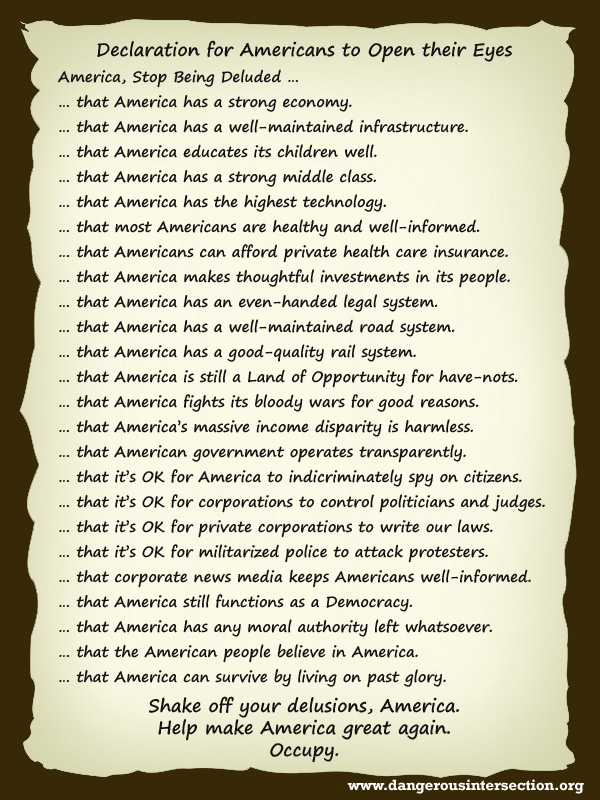Mark your calendars for The Fourth-of-January, the antipode of The Fourth-of-July.
 The Fourth-of-January will be a new national date of remembrance. This new occasion will be about the United States of America, but there won't be any fireworks and it's not going to be a happy occasion. In fact, as happy as the Fourth-of-July is, the Fourth-of-January will be the diametric opposite. Citizens will somberly recognize the Fourth-of-January by gathering together to watch mock funerals wind through their city centers, where they will mourn the death of democracy. An American flag will be placed prominently on the hearse, serving as a symbol of the deceased.
On the Fourth-of-January, American citizens will actually bury these American Flags to recognize the fact that ordinary citizens of the United States have no meaningful input in how their federal government is run. At the destination of the funeral procession, citizens will carve these words onto the tombs:
The Fourth-of-January will be a new national date of remembrance. This new occasion will be about the United States of America, but there won't be any fireworks and it's not going to be a happy occasion. In fact, as happy as the Fourth-of-July is, the Fourth-of-January will be the diametric opposite. Citizens will somberly recognize the Fourth-of-January by gathering together to watch mock funerals wind through their city centers, where they will mourn the death of democracy. An American flag will be placed prominently on the hearse, serving as a symbol of the deceased.
On the Fourth-of-January, American citizens will actually bury these American Flags to recognize the fact that ordinary citizens of the United States have no meaningful input in how their federal government is run. At the destination of the funeral procession, citizens will carve these words onto the tombs:
Here lies Old Glory, destroyed by Citizens United and by the unwillingness politicians to pass a Constitutional Amendment and enabling laws to remove private money from the American political system.
The Fourth-of-January will be a day when people consciously refrain from reading
The United States Constitution,
States Constitution, lest they become deluded that federal politicians are
public servants of ordinary citizens. It will be a day when, instead, mourners read proclamations that the existence of vast amounts of money in the political system has made it impossible to meaningfully debate even the simplest of political issues. It will be a day when Americans recognize that big corporate money has turned America's politicians into
psychopaths. It will be a day when Americans remind themselves that their every year their politicians spend
more tax dollars to air-condition soldiers' tents in the Middle East than they allocate for the total budget of NASA, to explore the mysteries of outer space.
The Fourth-of-January will be a date when Americans consider renaming of all of their major holidays based on fact that quest for
corporate profits now dominate all celebrations, and that America's
news media celebrates this fact. On the Fourth-of-January, Americans will recognize that, contrary to the will of the People, America has become unstoppably addicted to warmongering, and that it has become a nation that doesn't treasure safe food, medicine, chemicals, air and water. It has become a nation that allows big banks, fossil fuel companies, telecoms and insurance companies
to write national laws that cause massive financial damages to the People. On this new Day of Remembrance, Americans will pause for a moment of silence to recognize the brutalizing and almost unstoppable financial and political power of America's corporate-military-prison-industrial-Complex.
The Fourth-of-January will recognize that laws passed contrary to the wishes of the majority of citizens have resulted in sub-standard schools, catastrophic national debt, state sponsored torture, spying on citizens, governmental secrecy and abuses inflicted on citizens and journalists who are attempting to exercise their Constitutional rights. On the Fourth-of-January Americans will recognize that their highest court has become deaf to the needs of the People, and that
the "rule of law" is rapidly becoming available only to those of significant financial means. The Fourth-of-January is a day when we warn our grade school children that much of what they are reading in their American civics textbooks is stunningly false.
The Fourth-of-January will be celebrated every year unless and until the corrupting force of private money is removed from the American political system.
--
[Photo credits:
Derivative work funeral photo by Erich Vieth, incorporating flag photo by
Tarajane at Dreamstime.com (with permission) and
Original funeral photo, which is a public domain work. Corporate flags photo by Erich Vieth, photo taken at the 2011 downtown St. Louis Fourth of July celebration].



